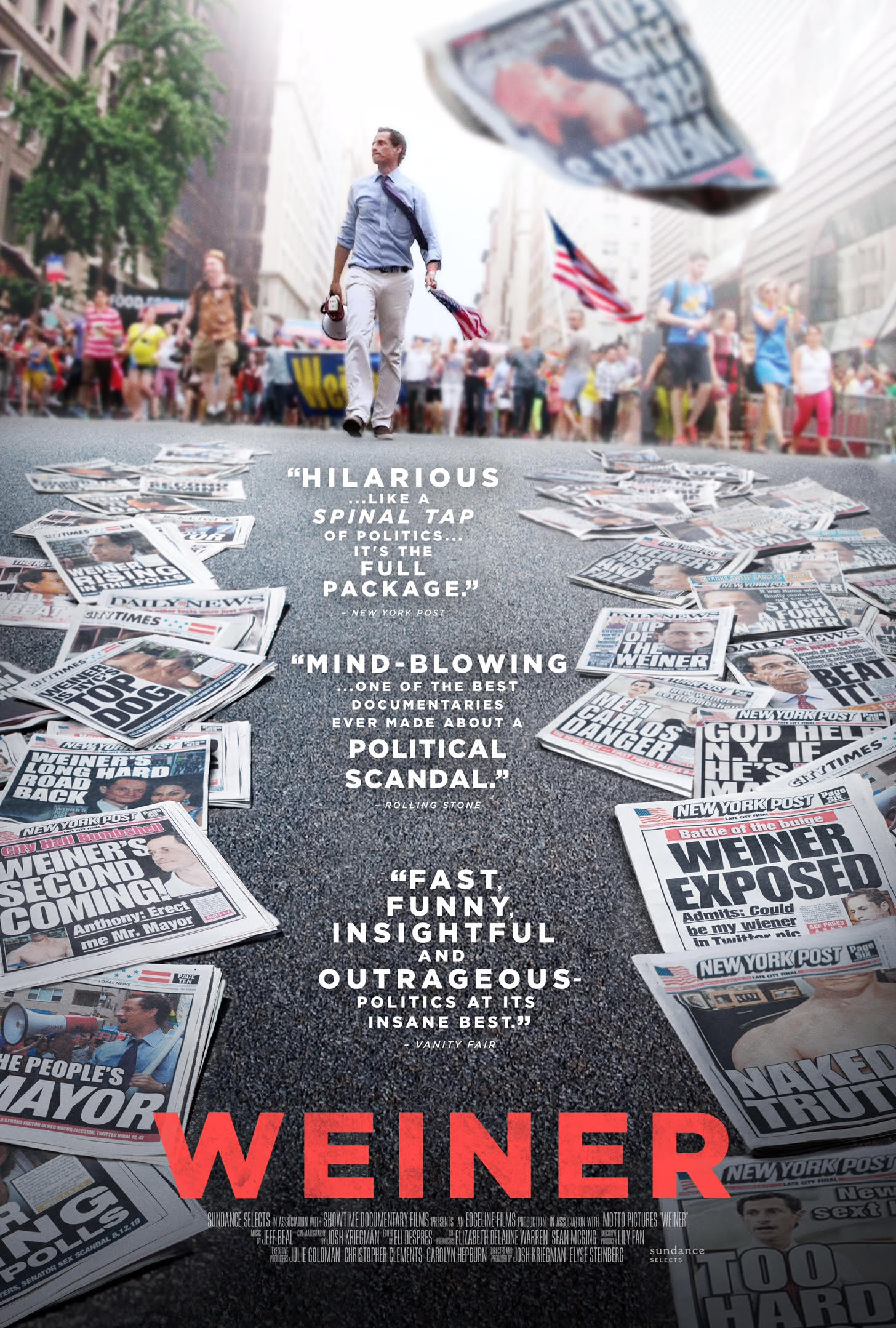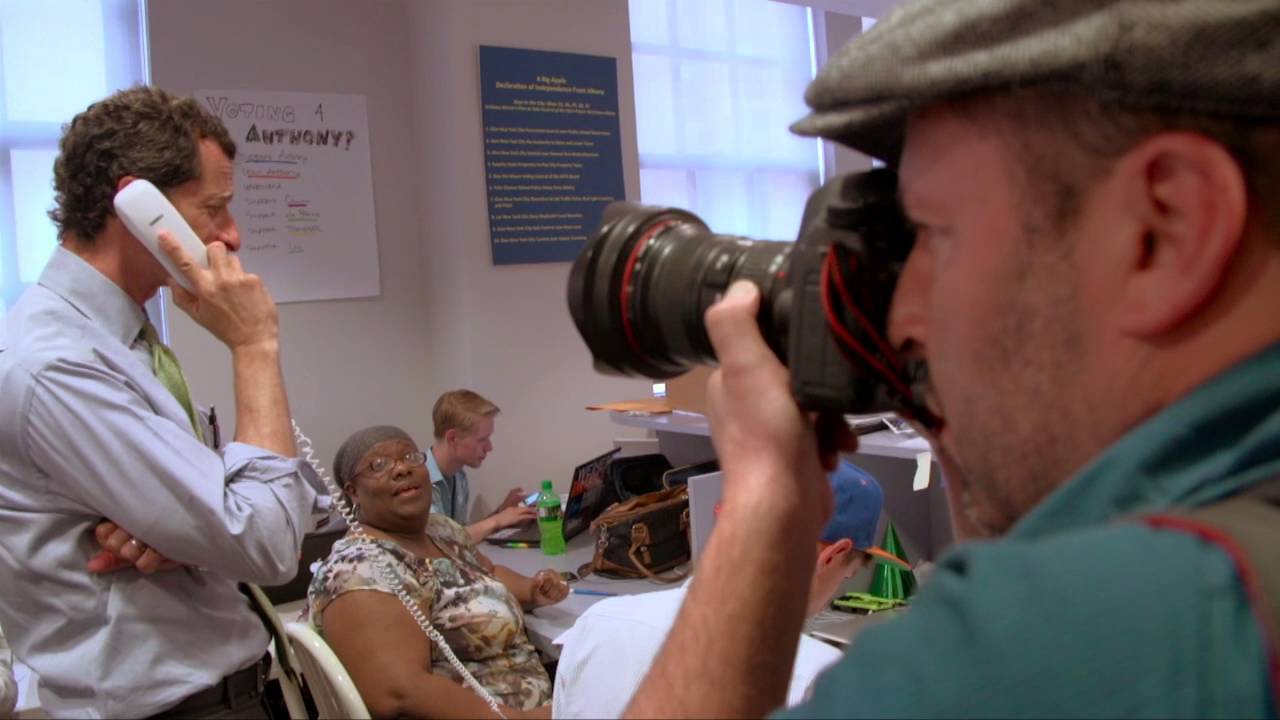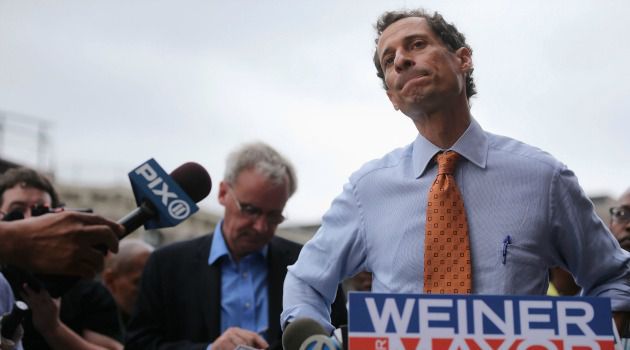Review: Weiner
 Tuesday, May 24, 2016 at 5:00PM
Tuesday, May 24, 2016 at 5:00PM  To paraphrase Jean-Luc Godard: if you want your movie to hook an audience, all your story needs is a girl and a smoking gun. In Josh Kriegman and Elyse Steinberg’s queasily absorbing political documentary Weiner, the two smash against one another on the dick pic-riddled smartphone of disgraced former congressman, Anthony Weiner of New York.
To paraphrase Jean-Luc Godard: if you want your movie to hook an audience, all your story needs is a girl and a smoking gun. In Josh Kriegman and Elyse Steinberg’s queasily absorbing political documentary Weiner, the two smash against one another on the dick pic-riddled smartphone of disgraced former congressman, Anthony Weiner of New York.
Capturing Weiner’s catastrophic 2013 New York City mayoral campaign from within the scrum and beyond the sack, the film scrutinizes the self-obsession of its candidate against his noble political ideals, and the media’s lethal manipulation of the former and abject disinterest in the latter. It is also a thrilling and meticulous account of a campaign staff in free-fall, with the candidate mistaking the whir of escaping air for flight. If D.A. Pennebaker’s The War Room shows us how the machinations of campaign politics successfully operate around pitfalls and personal indiscretions along the trail, Weiner demonstrates how the media can lethally wedge a dildo right between the gears.

A principled loudmouth and liberal lion in the making, Weiner was ahead of the game while he was in Congress from 1997-2011 when it came to breaking decorum to break through politically correct clutter and champion heart-sleeve causes while exposing the feckless tactics of your partisan enemies. In short: he knew how to raise his voice and where to point it. While the tactic occasionally felt shrill, his targets were altruistically aimed: Republican obstructionists blocking federal aid for 9/11 first responders, interloping moralists opposed to a woman’s right to choose, and politicians of both parties who opposed a single-payer health care system. Those high-tempered, high-decibel speeches on the House floor generated millions of hits on YouTube and the avatar for his cheeky Twitter page was a self-deprecating photo of the feisty politico as an unkempt, nerdy high schooler. His connections to the Clinton political dynasty were nearly blood relative; Bill Clinton officiated his wedding to the brilliant diplomat Huma Abedin, Hillary’s closest aide. To many working class Democrats demanding a voice and an increasingly tech-driven media thirsty for hits, his enthusiasm and willingness to engage his vocal cords made him a hero to both and, perhaps, the next Mayor of New York City. It’s when he showcased a different organ in the public arena that the charm wore off and both of those bases turned against him.
Meant for a female fan via direct message, Weiner accidentally tweeted a photograph of his bulging boxer briefs to thousands of followers – thankfully, like many a failed House bill, it never made it out of the chamber – and his stubborn refusal to admit to both his wife and the press that the crotch in question was indeed his own alienated him from his party and, most importantly, the affections of the people. Eventually, after a steadfast barrage of lies, Weiner resigned from Congress. Two years later, hell-bent on reclaiming his seat in the courts of public opinion and influence, he would attempt a political comeback in the aforementioned mayoral race. He would also allow a documentary team to capture the experience as fly-on-the-wall observers. Late in the film, he snaps to the unseen group that he’s never heard of a fly with so many prodding questions.
The campaign starts off on a buzzing and substantive note. Weiner releases sixty-four individual ideas for how to improve the city. More widely known as background player than a public face, Abedin turns out to be a brilliant advocate at the microphone. Ahead in the polls, accruing an excited and diverse staff, and waving a gigantic rainbow flag at Pride with a preening skip in his step, Weiner finally reconciles his ability to walk the walk with his facility to talk the talk as victory seems more and more likely. Until, of course, a brand new sexting scandal comes to light and reporters’ interest in his ideas immediately wanes in favor of juicy scoops and spilled tea. Cast in a new, familiar light, his sure-footed march seems more like posturing and his principled charisma looks closer to desperate arrogance. His inability to answer straightforward questions about what went down when, where, and on whose phone further strips him of his most prized possession: authenticity. In the face of journalists’ infinite torrent of sex-obsessed questions, his dodgy disposition rolls nothing but gutter balls.
While this whirlwind rise-and-fall happens in the film’s first act, this viscous mixture of Weiner’s swaggering persona and the weather-vane narratives surrounding it colors the main dramatic tension of the film for it impacts nearly every decision made by the candidate, the campaign, and the larger media environment surrounding it. The story is the story, optics are everything, and any loose thread in the campaign’s official version of events can unravel the whole candidacy. With the entire world zeroed in on your every move, a single misstep becomes an unrecoverable risk – so why does Anthony Weiner continue to stomp around looking for a fight he can’t win?

Witnessing Weiner’s arrogance is a bracing and uncomfortable experience, for he often fancies himself the victor just because he locked himself into a cage match. He can’t help but throw a punch when provoked. Voters on the campaign trail call him out on his trustworthiness and he proceeds to bulldoze them with rhetorical questions and condescending snark. Weiner swears to hate bullies and yet he blurs that line by sticking his own foot in his mouth and claiming an opponent put it there. When he’s not being provoked, he’s markedly less sure of himself. While Abedin’s fundraising calls are filled with warmth, Weiner’s feel canned. In one of the film’s best scenes, he calls a team meeting in his living room after days of being hammered by the press. Because he never disclosed information about the second scandal to his senior team ahead of time, they’re rightfully smarting over their embarrassing predicament. Abedin and their child are weaving in and out of the room in a clash of personal and professional boundaries; he only called the meeting under his own roof to have a home team advantage against his staff.
The idea of persona in contemporary politics is a fascinating one: if a candidate makes a winning argument and there’s no camera around to capture it, did it happen at all? And if the media refuses to ask a policy question, do you have a platform? Weiner edits to expose the cracks between reality and broadcast fabrication and locate the grit in between. Seamlessly stitching between anaesthetized campaign ads and media interviews and the actual filming of them – cutting from a frozen-faced Weiner promising education reform to a wide shot of him isolated by innumerable lights, camera equipment, and make-up designed to drain the reality out of the shot – Weiner is as much a film about presentation in the internet age as it is a character study of a chameleonic opportunist with no one on his side.
Weiner’s attempts to control his own narrative fall mostly on blind eyes and deaf ears – it’s the ones they do reach that are the most disturbing. The beguiling Abedin silently steals the film – always five steps ahead of her husband, her discomfort with the camera crew appears almost from the get go – and her ambivalence haunts each frame she’s in. She knows he’s a walking disaster. While Weiner doesn’t seem to understand why rewatching past performances of himself on YouTube is revolting, or why he thinks he can save himself from the fallout by doubling down on his losing hand, Abedin’s intuition is largely ignored despite being the player with the most influence in the room. As she removes herself from the campaign, Weiner behaves like a spoiled child, feeling abandoned; never mind that it’s his transgressions that got them all into this mess in the first place. Sympathy abounds for Weiner but he manages to squander it at every turn.

Dramatic irony drenches the film. We all know how this story ends. Because its protagonist doesn’t grasp this inevitability until it’s over, Weiner captures a train wreck in slow motion and shields you from none of the casualties or debris. It’s like watching him Rocky jog up a down escalator, pumping his hands in the air as he slides to certain defeat. Cringe-worthy cinema at its most exacting, the unflinching gaze of Kriegman and Steinberg’s camera takes no prisoners in parsing the ridiculousness of self-serious campaigns themselves (the repeated phrase “tick-tock of my plan” could easily come from Veep’s Jonah Ryan; a sprint through McDonald’s to avoid an awkward encounter feels like a scene from the same show) and the single-focus journalists who cover them. Breaking a politician’s bones make for a more attractive headline, but ignores the marrow of crucial policy issues and passionate advocacy. With a mercurial subject like Anthony Weiner, the line between personal and professional boundaries crumbles but it’s hard not to get wrapped up in the wreckage.



Reader Comments (5)
Really looking forward to see this movie.
This isn't normally my type of film - but the trailer for this thing is hilarious
I hate when writers assume all the readers arw from the united states. A little more context would be great
Valeu falous
This sounds so intriguing. Very nicely written review, by the way.
thank you for this extensive review.